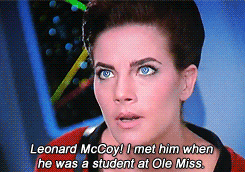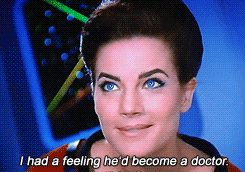
At some point I’m going to write a post about why it’s important to nominate for the Hugo Awards if you can and why you don’t need to have read everything or even widely to nominate. That’s a long post, though, and it’s Friday. What’s good for Fridays is giving you a list of things to read that will give you pleasure. i.e. My recommendations for Hugo nomination-worthy fiction.
Novel
The Fifth Season, N.K. Jemisin
A book that tells the brutal truth about oppression and marginalization. And it’s just damn good.
The Grace of Kings, Ken Liu
I’m not a huge epic fantasy person and this book still managed to hook me. The combination of a book set in a China-influenced fantasy world that isn’t white-gaze-Orientalist nonsense, a fantasy world that isn’t mindlessly patriarchal by default, and a grand story that encompasses gods and mortals without being as tiring as Homer made me a fan of this book.
Uprooted, Naomi Novik
One of the most well-crafted books I’ve read in a long time.
Novella
The New Mother by E. J. Fischer | Asimov’s Science Fiction Magazine [Read It Here]
This novella takes place in a very near future. So near that the issues it tackles are barely removed from their current counterparts. Reproductive rights, personhood, our culture’s puritanical views on sex, religion, cloning, and so many of the other conversations connected to these topics. Fisher avoids preachiness (well, I say that because I happen to be the choir) and instead uses all of this to explore what it means to be human.
The Bone Swans of Amandale, C.S.E. Cooney [In This Collection]
It’s beautiful. I mean… I don’t even know what else to say except this is just beautiful and moved me deeply.
Trixter – The Trix Adventures, Volume 1, Alethea Kontis [Standalone]
If you’re a fan of mixed up and remixed fairy tales then you need to read all of Alethea’s middle grade books. Though this is part of that whole series/world, you can start with this short novel as an entry drug to the rest. Trix is a lot of fun.
Novelette
Entanglements by David Gerrold | The Magazine of Fantasy & Science Fiction [Read It Here] (this was originally listed as a novella. Sorry!)
Reading this story was like wandering into a party at a big con and somehow stumbling on the corner where some giant of the field is quietly holding court, and only those lucky enough to have torn themselves away from (or escaped) some less interesting blowhard get to be witness to it. This giant of the field is telling you a story, and that story probably has a straightforward version, but he keeps veering off into these tangents, and you don’t care because these tangents include tidbits about that time Gene Roddenberry bought his first computer and Majel Barrett freaked out because the simplistic AI was just complex enough to make it seem like it was carrying on a conversation and so on…
But then, oh then, you get to the meat of the story this guy has been trying to tell for an hour and you are stunned, just stunned, because he just blew your mind with insight and you’re wiping tears from your face because you see yourself in bits of that story (especially that bit about still owning a Zune because it was better than the iPod and shut up) and now you’re contemplating the meaning of your life and he’s got up to go to the bathroom and… wait… what was that about killing a man?
Fabulous Beasts by Priya Sharma | Tor.com
This story is very dark and very engaging. The voice just sucks you in and holds you down as the story slowly builds and builds to the justified, disturbing end. This is the kind of horror I tend to gravitate to even though horror as a whole isn’t my favorite genre. The way it mixes the real and the supernatural and the woman’s tight point of view both contribute to why I highly recommend this story.
And You Shall Know Her by the Trail of Dead by Brooke Bolander | Lightspeed Magazine
I immediately resonated with this piece based on my own history, and throughout the author plucked all the right strings in me to make me love this. It’s about the things one will do out of grief and love and pressing down sadness, wonderfully rendered and woven.
Sacred Cows: Death and Squalor on the Rio Grande by A.S. Diev | Giganotosaurus
This novelette is worth settling in to read and spend some time to think about. The imagery of a herd of cows flying through the sky is somewhat comical, though that aspect quickly dissipates as the narrative goes on. It’s a story about corruption, corporations, and rich men who get away with far too much because they are rich. That concept is hardly futuristic, I know. But so many people fail to question the doctrine of “because we can” that permeates so much of everyday people’s lives.
Something one of the characters says toward the end really sums up everything about this story: “It’s not that they are bigger and stronger. It’s not that they win every contest, and have more of everything, even while some of us truly don’t have enough. It’s that they still want more. They have to be above you, and step on you, and defecate on you. They have to rub it in your face.”
Folding Beijing by Hao Jingfang, trans. Ken Liu | Uncanny Magazine
Short Story
When Your Child Strays From God by Sam J. Miller | Clarkesworld Magazine
Snuck into this story about an evangelical Christian pastor’s wife dealing with the sinful rebelliousness of her teenage son is a really cool made up drug that sounds absolutely transformative and I want to try it (along with a few close friends… very close). Miller excels at blending cool speculative ideas with characters and situations very much grounded in our world.
These Eyes Are Not My Own by Jennifer Nestojko | Crossed Genres Magazine
Those of you who’ve ever been in a relationship with a person with different privilege or experience of marginalization than you will recognize the personal dynamics in this story. It’s very tense and sad and you’ll find yourself all tangled up in the main character’s emotions almost immediately.
Hungry Daughters of Starving Mothers by Alyssa Wong | Nightmare Magazine
This story is so visceral and it doesn’t hold back on all that’s implied in this opening bit. Wong has a talent for creating horrific situations that nonetheless feel right and even righteous. It’s not easy to make a reader identify or empathize with a narrator of this nature, and yet the author manages to do so (for me, at least).
Liminal Grid By Jaymee Goh | Strange Horizons
I love everything about this story. The voice, the tone, the dialogue, the characters, the story itself. I love the core of the story, summed up here: “Tyrants must be told somehow that they will be left in the morass of their own corruption. Everyone has the right to live, grow, dream, build at their own pace. Leaving, too, is resistance.”
Catcall by Delilah S. Dawson | Uncanny Magazine
If you’ve been reading my column for a while you know my fondness for revenge and They Got What Was Coming To Them stories. That’s exactly why I like this one. It’s for every girl and woman who is sick of the neverending cavalcade of unwanted touches and roaming eyes and disgusting words and everything else that comes with rape culture and wishes she had the power to do something about all of it.
If I believed in misandry, I could call this story MISANDRY MISANDRY MISANDRY without fear or shame.
Madeleine by Amal El-Mohtar | Lightspeed Magazine
Falling into memories the way we fall into dreams—with that same hyper-real yet not real tension and thrill/terror of not always being able to escape—sounds like a thing that could be fun at first but would quickly devolve into a terrifying way to live. What if, in these memories, you found the exact thing you needed to make you feel like you should continue existing? El-Mohtar explores this and more in this gorgeous story.
The Great Silence by Ted Chiang | e-flux journal
Chiang collaborated with visual artists Jennifer Allora and Guillermo Calzadilla to create a story based on their video piece “The Great Silence.” Not having seen the original video I can’t comment on how well each piece compliments each other. Even without that background, the story is moving, heart-breaking and beautiful — and is made up of at least 60% lines that will be quoted forever.
With the exception of the short story category, I still have room for a few other nominations. I want to what everyone else has on their short list. List ’em in the comments, use the #HugoNoms hashtag on Twitter, poke me on Facebook!
I’ll put up my recs for the not-fiction categories next week. And, of course, I am eligible for some of those categories.










